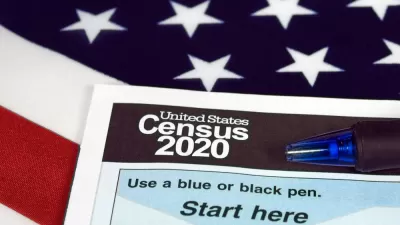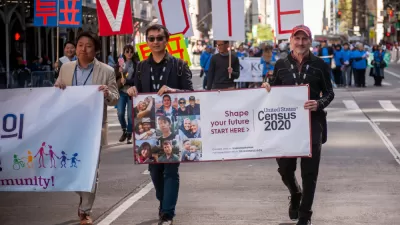Census 2020 faced funding challenges, leadership changes, and unprecedented politics on its way to a big launch this week. Now the coronavirus is sending people into social isolation, making the process of an accurate count very difficult.

The U.S. Census Bureau picked a hell of week to kick off its once-a-decade enumeration of U.S. residents.
With most of the U.S. public understandably distracted by world events, 2020 Census questionnaires will soon be available to fill out online, by phone, or by mail. Most Americans can expect to find an invitation to the Census in the mail any day now.
Among the 2020 Census news items anyone might have missed this week: U.S. Department of Commerce Secretary Wilbur Ross, who oversees the Census, fielded questions from the House Appropriations Subcommittee about the potential of the coronavirus to interfere with the Census.
NPR reporter Hansi Lo Wang reported details of the hearing via Twitter, including a soundbite of Secretary Ross promising that Census officials have "done as much as we can to be ready for whatever contingency comes up." Ross specifically called attention to the availability of the Census questionnaire online, and the ability to also complete the Census by phone or by mail—measures that will allow members of the public to participate in the 2020 Census, even while practicing social distancing.
Recruitment and retention of Census workers will also present challenges. Census workers are scheduled to start outreach with homeless communities at the end of March, and will start going door-to-door at colleges, senior centers, and on household follow ups in April. With unemployment levels low in much of the country (for the moment anyway), the Census will rely on thousands of people signing up for the job of going door-to-door—all while respected media outlets are telling readers to "cancel everything"?
It's not just Census workers that will be hard to rally. "The risk that the virus represents to the 2020 survey extends beyond these door-to-door follow-up counts," write Sarah Holder and Kriston Capps for CityLab. "A successful census relies on the efforts of community associations, faith-based organizations, and other groups to muster a complete count."
Census Director Steven Dillingham addressed concerns like those reported by Holder and Capps in a statement on February 26. "The safety of the American public and our employees is job one," the statement reads. "We are working with national health authorities, including the Centers for Disease Control and Prevention, the U.S. Department of Health and Human Services, and the President's Task Force, as well as state and local health departments to ensure all of their guidance is incorporated into our operations."
Optimism about the abilities of the Census Bureau to overcome these challenges headlines an article published by Quartz, which proclaims: "The US census has built-in resistance to coronavirus." The article by Holder and Capps concludes on a similarly hopeful note:
“If you look at any news story in any decade, there are always stories of census offices that burn down. I think the 1850 census schedules from California were lost at sea,” [Margo Anderson, professor emerita at the University of Wisconsin-Milwaukee and author of The American Census: A Social History] said. “The Census Bureau right now is likely working on this as we speak. They always have fallback positions.”
The years-long process of preparation for the 2020 Census has been punctuated by far less optimism, however. Questions about the Trump administration's commitment to an accurate count have been raised almost since the inauguration. John H. Thompson, head of the U.S. Census Bureau from 2013 to 2017, resigned from the position during a reported funding crisis at the Census. In the same year, the Census Bureau delayed the Economic Census because of a lack of funding. In 2019, Secretary Ross chose truancy instead of showing up to discuss the budget of the 2020 Census with the House Appropriations Subcommittee.
The most concerning bump on the road to the 2020 Census involved a disputed citizenship question. Critics accused the Trump administration of proposing a citizenship question to deliberately limiting Democratic representation at the federal and state levels. Eventually, a leaked hard drive proved those accusations true. Research also showed that the question would suppress participation among Latinos and immigrant communities.
The Trump administration's efforts to add a citizenship question to the 2020 Census made it all the way to the U.S. Supreme Court, but could not be resolved in time to appear on the Census questionnaire. The influence of the effort is still obvious. In February 2019, the Census Bureau announced concerns that deliberate misinformation would influence the ability of Census workers to collect information among vulnerable communities—a concern confirmed a year later by survey results finding widespread misunderstanding about the Census.
The Census is always a challenge, and the final result is always probably an inaccurate count, but this Census will need deeply committed champions, and constant attention, to serve its constitutional duty. The hard work starts this week.

Planetizen Federal Action Tracker
A weekly monitor of how Trump’s orders and actions are impacting planners and planning in America.

Maui's Vacation Rental Debate Turns Ugly
Verbal attacks, misinformation campaigns and fistfights plague a high-stakes debate to convert thousands of vacation rentals into long-term housing.

San Francisco Suspends Traffic Calming Amidst Record Deaths
Citing “a challenging fiscal landscape,” the city will cease the program on the heels of 42 traffic deaths, including 24 pedestrians.

Defunct Pittsburgh Power Plant to Become Residential Tower
A decommissioned steam heat plant will be redeveloped into almost 100 affordable housing units.

Trump Prompts Restructuring of Transportation Research Board in “Unprecedented Overreach”
The TRB has eliminated more than half of its committees including those focused on climate, equity, and cities.

Amtrak Rolls Out New Orleans to Alabama “Mardi Gras” Train
The new service will operate morning and evening departures between Mobile and New Orleans.
Urban Design for Planners 1: Software Tools
This six-course series explores essential urban design concepts using open source software and equips planners with the tools they need to participate fully in the urban design process.
Planning for Universal Design
Learn the tools for implementing Universal Design in planning regulations.
Heyer Gruel & Associates PA
JM Goldson LLC
Custer County Colorado
City of Camden Redevelopment Agency
City of Astoria
Transportation Research & Education Center (TREC) at Portland State University
Jefferson Parish Government
Camden Redevelopment Agency
City of Claremont




























